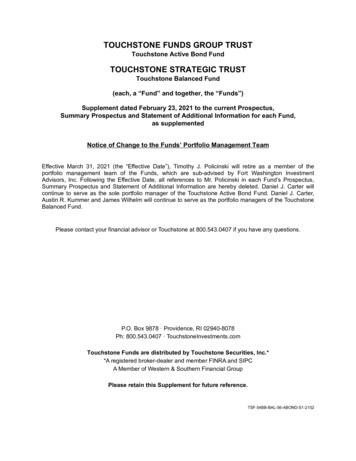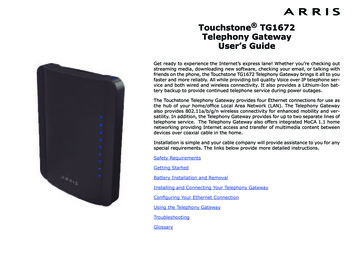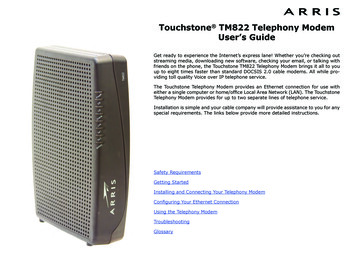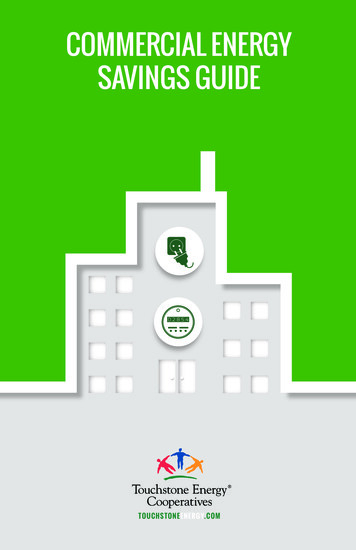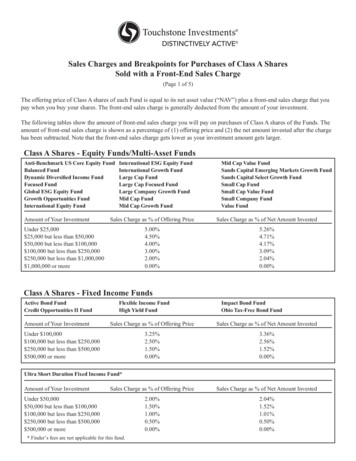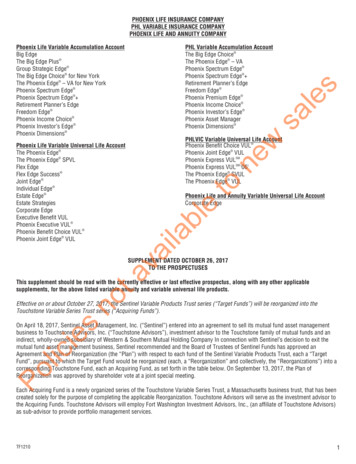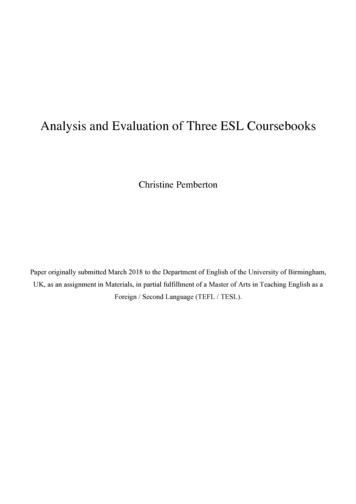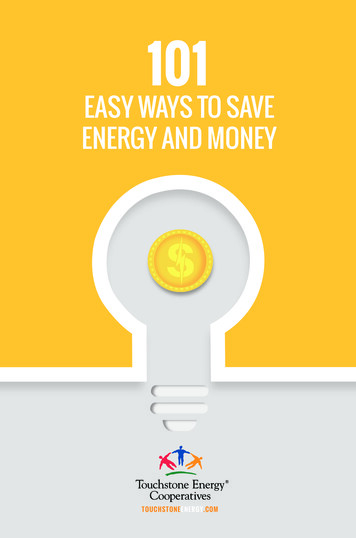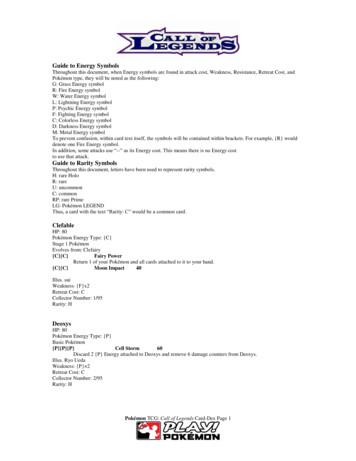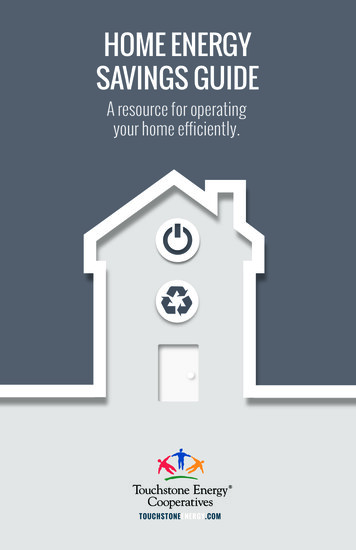
Transcription
HOME ENERGYSAVINGS GUIDEA resource for operatingyour home efficiently.TOUCHSTONEENERGY.COM
TOUCHSTONEENERGY.COMFIND OUT HOW THE LITTLECHANGES ADD UP.Flip the switch. Lower the blinds. Insulate your attic. Lower thetemperature on your thermostat. These sound like simple tasks. takeall of these steps around your home and you can rack up big savings.TOGETHER WE SAVE.This home energy savings guide contains valuable tips on how toimprove your home’s efficiency.For more information, please contact your local Touchstone Energycooperative and visit TOUCHSTONEENERGY.COM
H OM E ENER GY SAVIN GSYour Touchstone Energy cooperative works hard to hold down energy prices. Youcan help control your energy costs by evaluating your home and using thefollowing simple tips to trim energy use.H OM E ENER GY C OST SGet a clear picture of which parts of your home use the most energy. The first step in reducing home energy costs is to review last year’s utilitybills. Using the below national “percentage” averages, a homeowner whospent 2,060 a year according to the US Dept of Energy.Heating 597.40Electronics 432.60Water heating 267.80Cooling 267.80Lighting 247.20Appliances 247.20 When implementing energy-saving measures, be aware of the energy savingsfrom the investment. Contact your local Touchstone Energy cooperative to review your bills andreceive a more accurate estimate. Go to TogetherWeSave.com for moreinformation.Where Does My Money Go?Annual Energy Bill fora typical single familyCoolingWater heatingLightingAppliance21%HeatingElectronics include:telephone and externalpower adapters, consumerelectronics (computer, TVsand DVD player), homeoffice equipment, andsmall appliancesElectronicshome is 2,06029%13%13%12%12%Appliance include:refrigerator, dishwasher,clothes, washer and dryerSource: Typical House Factoid Memo. Lawrence Berkeley National Laboratory. April 2013.
INSULATION If you have insulation in your attic graded at R-19 or less,consider bringing it up to R-38 in moderate climates andR-49 in cold climates. In cold climates, if you have floor insulation graded at R-11or less, consider bringing it up to R-25. Make sure there are no openings from the attic into thehome, e.g., air ducts, openings around chimneys, opencavities into the home.HOME ENERGY SAVING TIPSAssess how your family uses energy in your home. Don’t leave unnecessary lights on. Turn off computers and other office equipmentwhen they’re not being used, especially overnight andon weekends. A one degree increase in heating setpoint or reductionin cooling setpoint can increase energy use by 3 – 5%. Taking long showers runs up the water heating(and water/sewer) bills. Plug electronic devices such as cable boxes, printerand TVs into power strips to turn off during vacation orlong periods without use. Smart power strips make itan easy task to save money! Replace shower heads with low flow shower heads. When replacing your water heater consider a heatpump water heater which is a much lower operatingcost.
W I N D OWSWindows leak heat. If you have single-pane windows, consider doing thefollowing: Tighten and weather-strip your old windows and then add storm windows. Close shades and drapes during the day to help keep your home cooler in thesummer and warmer in the winter. In colder climates, “low-e” coatings on glass can help reduce heat lossthrough windows. In hot climates, consider adding solar screening to west-facing windowsthat catch a lot of heating late in the day. Solar screening is sold at manyhome improvement stores. Plants that shade the house help too.AIR INFILTRATIONAir that transfers in and out of homes through cracks, crevices and holesincreases energy consumption. Here are some helpful tips to avoidair infiltration: Seal around pipe penetrations coming through walls. During hot and cold weather, ensure windows are closed tightly and locked. Ensure weather-stripping around doors and windows is tight. When your fireplace is not operating, its flue should be closed tightly, witha sign hanging from the flue handle warning it is closed. Check the ceiling behind the cornice of built-in bookshelves for holes cutduring construction. Attic accesses stairways should fit tightly into the ceiling and be carefullyweather-stripped using insulated sheathing board. Remove the whole-house fan if not used and seal and insulate. Make sure your outside dryer vent door closes when the dryer is not in use.This requires cleaning away lint accumulation periodically.
WASHERS & DRYERSDrying clothes uses a lot of energy. Don’t over-dry your clothes. If 50 minutesworks, don’t set to 70 minutes. Make sure to clean the inside lint filter beforeeach drying cycle. Periodically check your flexible metal dryer venthose to ensure it is still tightly connected andnot kinked. Dryers with service problems should be replacedwith an Energy Star rated machine. Wash clothes in cold water. Replace old washers with an Energy Star Ratedsystem. They provide great savings from lowerwater use and fast spins that reduce the needfor drying.WATER HEATERYour water heater works with many of your home’sother systems. Make sure your water heater is set at the lowestpoint. Try setting it to 120 . For older washers, set the water level to theamount of clothes to be washed. Insulate accessible hot water lines. Overfilling your washer can increase yourenergy use. If your water heater is located inan unconditioned space, consider installinga thermal wrap around it. Take care to installit in accordance with the tank and wrapmanufacturer instructions.
REFRIGERATIONTrim your refrigerator’s energy use. Make sure refrigerator and freezer seals fit tightly when doors close. Keep outside coils clean. Dirty coils make your refrigerator compressorwork longer to remove heat. Setting your freezer below 0 uses extra energy. Setting your refrigerator below 37 uses extra energy. Ensure refrigerator door seals are tight and coils are clean. Replace seals if they no longer seal. Eliminate unnecessary refrigerators.HEATING & AIR CONDITIONINGHeating, ventilating, and air conditioning (HVAC) uses the largest chunk of yourhome energy dollar. Keep it running “lean and mean.” HVAC systems should be checked to verify they are moving the correctamount of air. An HVAC technician can tell you if it is. Heat pump and air conditioning systems should be checked annuallyto verify they are properly charged, strictly in accordance withmanufacturer guidelines. Inside and outside coils should be kept clean and free of debris. Gas furnaces should be tuned for maximum combustion efficiency. Change HVAC air filter monthly. We recommend low air flow resistive filters. Have an HVAC technician check carefully for duct leaks. Leaks that are foundshould be sealed with fiberglass mesh and mastic sealant. Leaks at the return, air handler and supply can be a major source of high bills.Mobile homes check at the grill, cross over duct and down flow air handler, forleaks.
LIGHTINGTake a look at your home’s lighting. Considerthese points: An LED light uses 1/5th the energy ofincandescent lighting and lasts up to50 times longer. Consider replacingincandescent lighting with energy-savingLEDs. They use about one quarter of theenergy, last much longer and give off lessheat. LED lights have different colors, soft whiteor 3,000 K bulbs are best for indoor use. Turn off lights when not needed. Don’t leave unnecessary lighting on duringthe day. Take a look at the security lighting youuse at night. Check with your TouchstoneEnergy cooperative to see if it can helpsave you money by installing apole-mounted outdoor light. Smart bulbs, outlets and switches allowyou to save energy by customizing aschedule that fits your families needs.
SELECTING A CONTRACTORSome of the work you will want to complete will require the services of acontractor. When selecting a contractor, keep in mind that the best priceis not always the best value. Here are some questions to ask when decidingwho to use: How long have you been in business? Can you provide proof that you are state-licensed and carry workers’compensation insurance? Can you provide the names of neighbors who have used your services? Are you a member of the Better Business Bureau?
NOTES:
TOUCHSTONEENERGY.COMFOR MORE INFORMATION ON ENERGY SAVINGS CHECK WITH THEFOLLOWING SOURCES: VISIT TOUCHSTONEENERGY.COOP FOR INFORMATION AND TOLOCATE YOUR LOCAL TOUCHSTONE ENERGY COOPERATIVE. U.S. DEPARTMENT OF ENERGY – ENERGY.GOV/YOURHOME.HTM ENERGY STAR – ENERGYSTAR.GOV ALLIANCE TO SAVE ENERGY – ASE.ORG YOUR STATE’S ENERGY OFFICE.
For more information, please contact your local TouchstoneEnergy cooperative or visit TOUCHSTONEENERGY.COM.Revised January 2019
Don’t leave unnecessary lighting on during the day. Take a look at the security lighting you use at night. Check with your Touchstone Energy cooperative to see if it can help save you money by installing a pole-mounted outdoor light. Smart bulbs, outle
